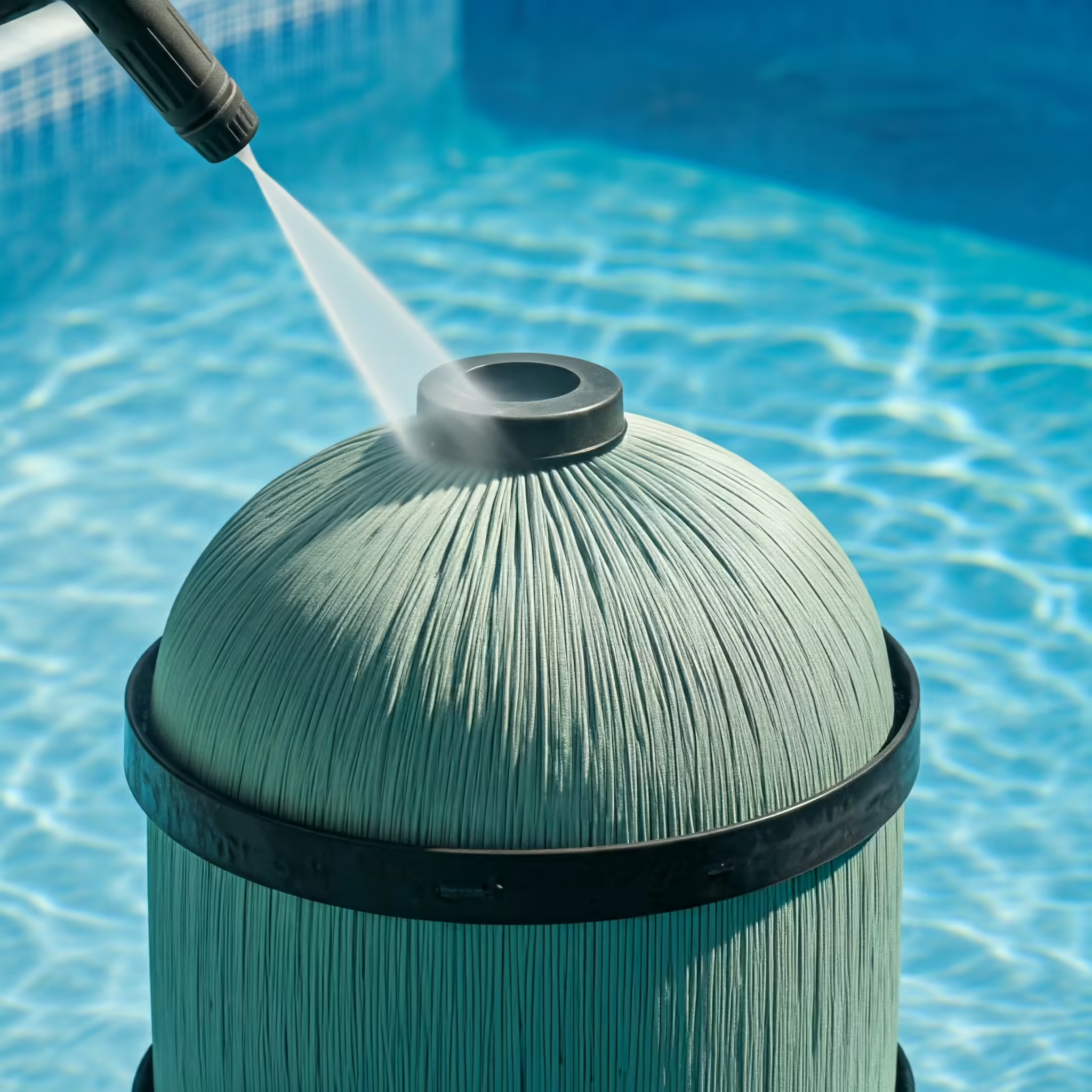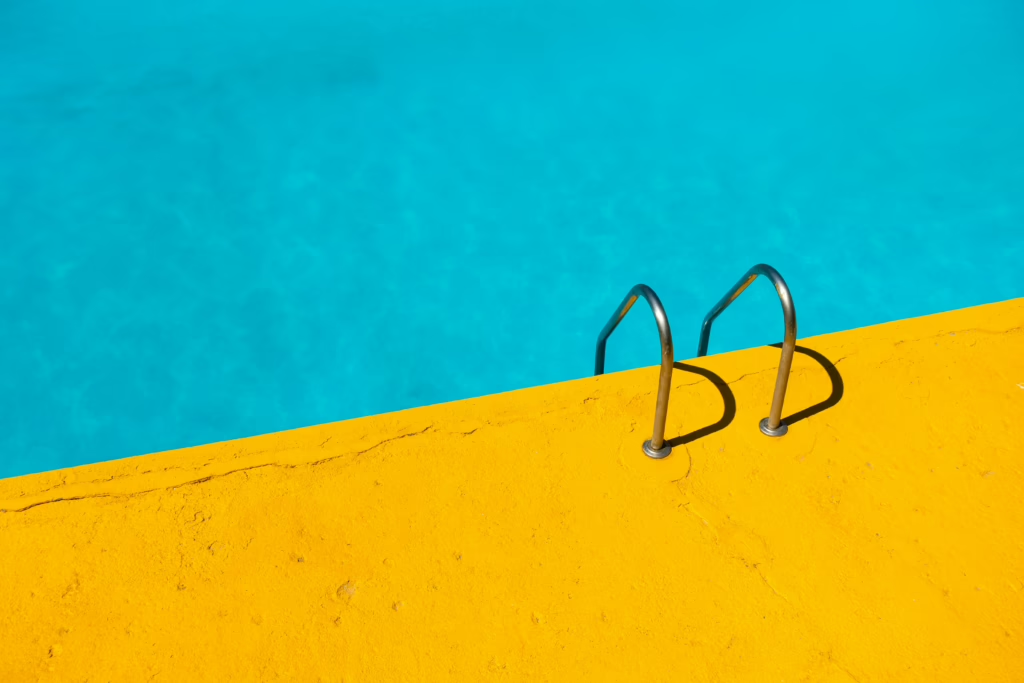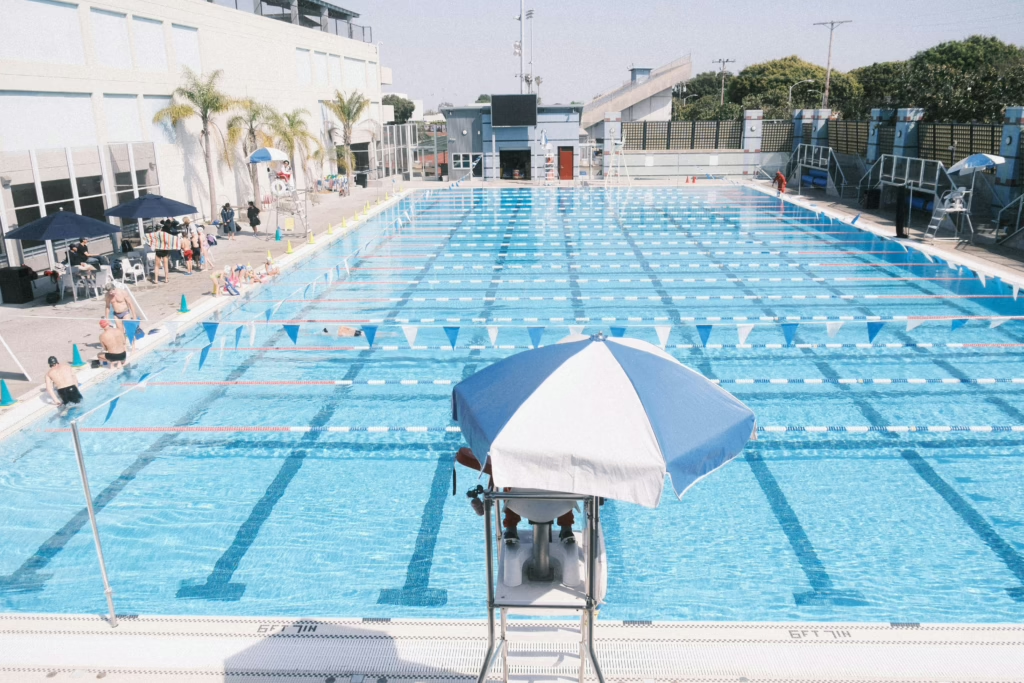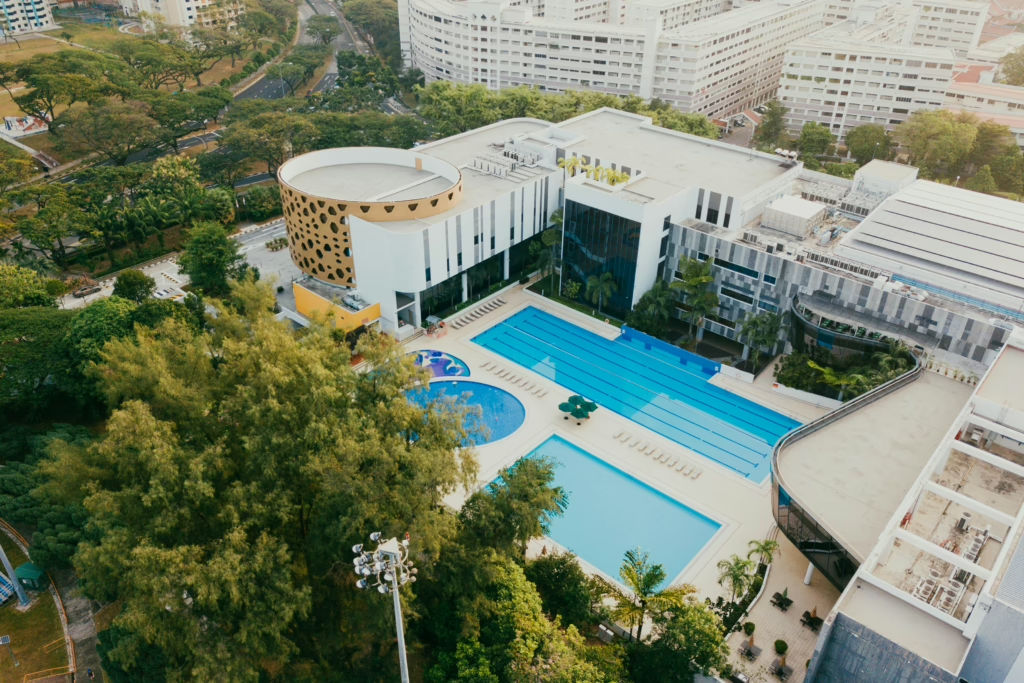Let’s be honest—there’s nothing worse than planning a perfect pool day, only to pull back the cover and find cloudy water or floating debris. Ugh. We’ve all been there, and it’s definitely not the refreshing escape you had in mind for that scorching San Diego afternoon. Your pool filter is basically the unsung hero of your backyard, quietly doing the dirty work to keep your water swim-ready.
When your filter starts to struggle, you’ll notice it pretty quickly—and not just in how your pool looks. Your wallet feels it too, with increased chemical costs and potential equipment repairs. Plus, nobody wants to host the neighborhood pool party with water that looks… questionable.
If you’ve found yourself typing “pool filter cleaning near me” into your search bar, you’re in the right place. I’ve put together this guide to help you spot the warning signs before things get out of hand. Trust me, knowing when your filter needs attention will save you headaches (and money) down the road.
Cloudy or Murky Water
When Your Pool Starts Looking Like Soup
Remember when you could see straight to the bottom of your pool? If your water has gone from crystal-clear to something resembling a foggy morning, your filter is probably waving a white flag. This cloudiness happens because your filter is so clogged with gunk that it just can’t trap particles anymore.
It’s kind of like trying to pour coffee through a filter you’ve already used ten times—eventually, stuff just starts getting through. The good news? A simple cleaning can often bring your water back to that gorgeous blue within a day or two. Your Instagram pool shots will thank you.
Reduced Water Flow from Pool Jets
When Your Jets Go from Powerhouse to Pathetic
Have you walked by your pool jets recently and thought, “Is that all you’ve got?” When those once-forceful jets start pushing water with all the power of a drinking straw, your filter is trying to tell you something.
Think about it like this—it’s like trying to breathe through a stuffy nose. When your filter gets clogged, water struggles to push through, and everything slows down. This doesn’t just make for boring jets; it means chemicals aren’t circulating properly, and you might end up with dead spots in your pool where algae throws a party. Next time you’re poolside, check those jets—they’re more talkative than you might think.
High-Pressure Gauge Readings
When Your Pool’s Blood Pressure Spikes
That little pressure gauge on your filter system? It’s basically a health monitor for your pool. Most filters are happiest working between 8-15 psi. When you notice that needle creeping 10 psi higher than normal, your filter is essentially saying, “Help! I’m struggling here!”
It’s similar to how your blood pressure rises when you’re stressed. Your pump is working way too hard, using more electricity, and risking an early breakdown. I recommend making a habit of checking this gauge when you’re doing your regular pool maintenance—it takes two seconds and can save you from a major headache down the road.
Visible Debris Floating in the Pool
When Your Pool Becomes a Leaf Collection Site
Finding yourself constantly playing “catch that leaf” with your skimmer net? While some floating debris is normal (especially after those Santa Ana winds kick up), having to skim your pool multiple times a day suggests your filter isn’t doing its job.
A healthy filter should grab most visible junk during normal circulation. If you feel like you’re fighting a losing battle against leaves, bugs, and mystery floaties, your filter probably needs some TLC. This is especially true if you clean everything out, turn around, and—boom—more debris appears out of nowhere. Your filter should be a one-way street for debris, not a revolving door.
Frequent Algae Growth
The Green Monster That Keeps Coming Back
There’s nothing quite as frustrating as treating your pool for algae on Monday only to see that familiar green tint returning by Friday. If you’re locked in this endless cycle despite proper chemical levels, your filter might be the sneaky culprit.
Algae is opportunistic—give it poor circulation and inadequate filtration, and it’ll take over faster than kids claiming the best pool floats. When your filter is clogged, microscopic algae spores slip right past your defenses and set up colonies throughout your pool. If you feel like you’re buying algaecide by the gallon lately, your filter is probably due for a good cleaning.
Dirty or Clogged Filter Media
The Heart of Your System Is Crying for Help
Whether you have cartridge, sand, or DE filters, sometimes the most obvious sign is just, well, obvious—your filter looks gross. For cartridge filters, those once-white pleats turn a lovely shade of brown. Sand filters start developing channels where water finds the path of least resistance. DE filters get clumpy and discolored.
Taking a peek at your filter media is like looking under the hood of your car—it tells you a lot about what’s going on. Most pool owners are surprised at just how dirty these components get. And just like changing your car’s air filter makes the engine run better immediately, cleaning your pool filter can transform your water clarity within hours.
Unpleasant Odors
When Your Pool Smells Like a Swamp, Not a Vacation
Does approaching your pool make your nose wrinkle instead of making you want to dive in? That’s a huge red flag. A properly maintained pool should smell clean—maybe a faint chlorine scent, but nothing offensive.
When organic gunk builds up in a struggling filter, it starts to decompose. And decomposing stuff smells. Bad. These odors range from musty to downright funky, and neither belongs in your backyard oasis. If neighbors start declining your pool party invitations, it might be time to check your filter before your pool develops its own ecosystem.
Pool Pump Strain and Unusual Noises
When Your Equipment Starts Singing the Blues
Has your once-whisper-quiet pump started sounding like it’s auditioning for a metal band? Those grinding, whining, or laboring sounds aren’t just annoying—they’re expensive warnings.
When your filter clogs, your pump works overtime trying to push water through an increasingly stubborn obstacle. It’s like trying to suck a milkshake through a coffee stirrer—eventually, something’s gotta give. Modern pool pumps can set you back $500-$2,000 to replace, making that $100 filter cleaning look like a bargain. If your equipment sounds like it’s struggling to breathe, your filter is probably gasping for help.
Increased Chemical Use
When Your Pool Becomes a Chemical Black Hole
Have you noticed your chlorine, pH adjusters, and clarifiers disappearing faster than snacks at a pool party? When you’re suddenly dumping more chemicals into your pool just to maintain basic water quality, your filter is likely underperforming.
It’s a vicious cycle—poor filtration means contaminants stay in the water, which means chemicals get used up faster fighting those contaminants. Not only does this hurt your wallet, but it can also turn your refreshing pool into a chemical soup that leaves swimmers with red eyes and itchy skin. If your chemical costs have doubled this season, your filter is probably the hidden culprit.
Following a Regular Maintenance Schedule
Because Prevention Beats Pool Problems Every Time
Look, I get it—life gets busy, and pool maintenance isn’t exactly the highlight of anyone’s weekend. But just like regular dental checkups prevent root canals, consistent filter care prevents most pool disasters before they start.
Different filters need different attention: cartridge filters need a good rinse every month or so, sand filters need backwashing when the pressure rises, and DE filters need both backwashing and fresh powder. If you can’t remember the last time you showed your filter some love, it’s probably overdue.
Living in San Diego means year-round pool weather for many of us, which also means year-round filter maintenance. Setting reminders on your phone for these regular check-ins can save you from the “green pool of shame” moments we all dread.
Frequently Asked Questions:
1. How often should I clean my pool filter?
It really depends on your specific situation, but here’s a good rule of thumb:
- Cartridge filters: Give them a rinse every 4-6 weeks during swim season
- Sand filters: Backwash when the pressure jumps 8-10 psi above normal
- DE filters: Same pressure guideline as sand, but don’t forget to add fresh DE powder afterward
If your pool sits under trees or hosts the neighborhood swim team, you’ll need more frequent cleanings. A good technician can help you figure out a schedule that makes sense for your particular pool’s needs.
2. What are the signs my pool filter needs cleaning immediately?
Some things just can’t wait. Drop everything and address your filter if you notice:
- Pressure gauge looking like it might explode (10+ psi above normal)
- Water that’s gone from blue to green overnight
- Debris constantly circulating back into the pool
- Your pump making sounds like it’s possessed
- Complete lack of water movement in your pool
If any of these are happening, it’s time to search “pool filter cleaning near me” and find someone who can come out ASAP.
3. Can I clean my pool filter myself or should I hire a professional?
You can absolutely DIY basic filter maintenance. Rinsing cartridges needs nothing more than a garden hose and some patience. Backwashing sand or DE filters is just a matter of turning a few valves in the right sequence.
That said, professional cleaning has some serious perks:
- The pros use commercial-grade solutions that blast away oils and scale your garden hose can’t touch
- They can spot worn-out parts before they fail completely
- Deep cleaning gets your filter way cleaner than a basic rinse
- Their experienced eyes catch problems you might miss
Many pool owners handle routine maintenance themselves but bring in pros for deep cleaning once or twice a year. It’s like brushing your teeth at home but still seeing the dentist regularly.
4. What happens if I neglect filter cleaning?
Skipping filter maintenance is like ignoring the check engine light on your car—things go downhill fast:
- First, your water gets a bit cloudy and you burn through chemicals
- Next come the algae blooms and your energy bill spikes
- Finally, your equipment starts failing and swimming becomes questionable at best
I’ve seen pumps burn out completely because filters weren’t cleaned regularly. Replacing equipment costs hundreds (sometimes thousands) more than routine maintenance would have. Consider regular filter cleaning cheap insurance for your pool investment.
5. How much does professional pool filter cleaning cost in San Diego?
In our area, expect to pay between $75-$150 for professional filter cleaning, depending on what type you have and how bad the situation is. Many companies (including ours) offer maintenance packages that bundle filter cleaning with other services for better value.
When comparing prices, ask what’s actually included—a quality service should involve system inspection, pressure testing, and honest recommendations about your equipment’s condition, not just a quick spray down.
Final Thoughts
Your pool filter might not be the most exciting part of pool ownership, but it’s definitely the most important. Treating it right means fewer chemicals, lower energy bills, and more time actually enjoying your pool instead of maintaining it.
Whether you’re a DIY champion or prefer calling in the pros, staying on top of your filter maintenance saves you money and frustration in the long run. Those warning signs we talked about? Think of them as your pool’s way of asking for help before bigger problems develop.
If you’re looking for “pool filter cleaning near me” in San Diego, give PoolLogic a call. Our team can get your filter back to peak performance with our efficient 5-minute setup process, meaning minimal disruption to your pool time. One visit from our technicians can mean the difference between a summer of crystal-clear swimming and one spent fighting water issues.
Want to stop worrying about your pool and start enjoying it again? Sometimes the simplest fix—a clean filter—makes all the difference. Let’s make that happen for you.



